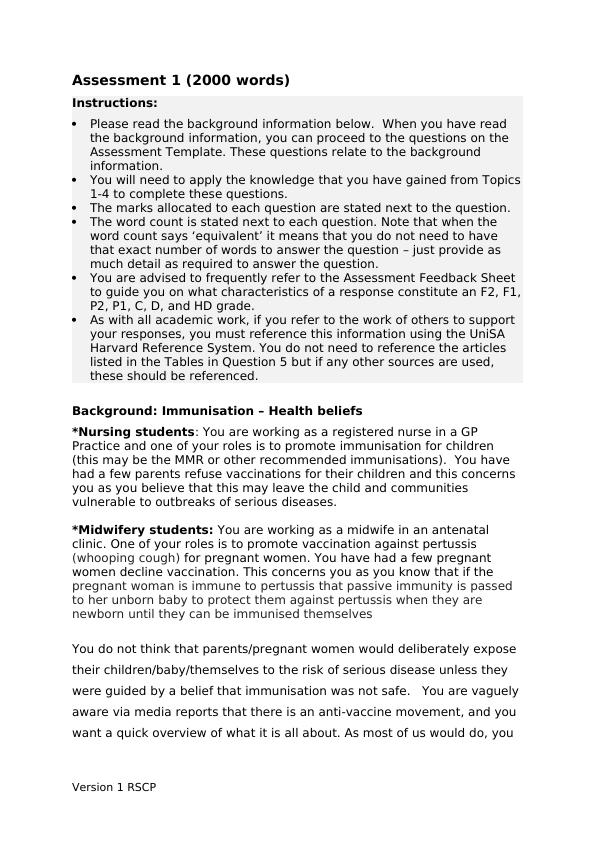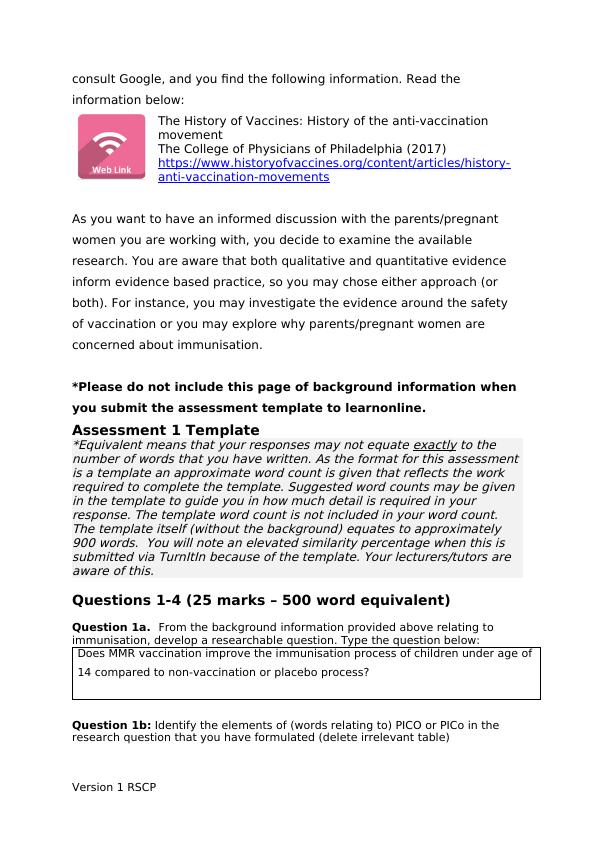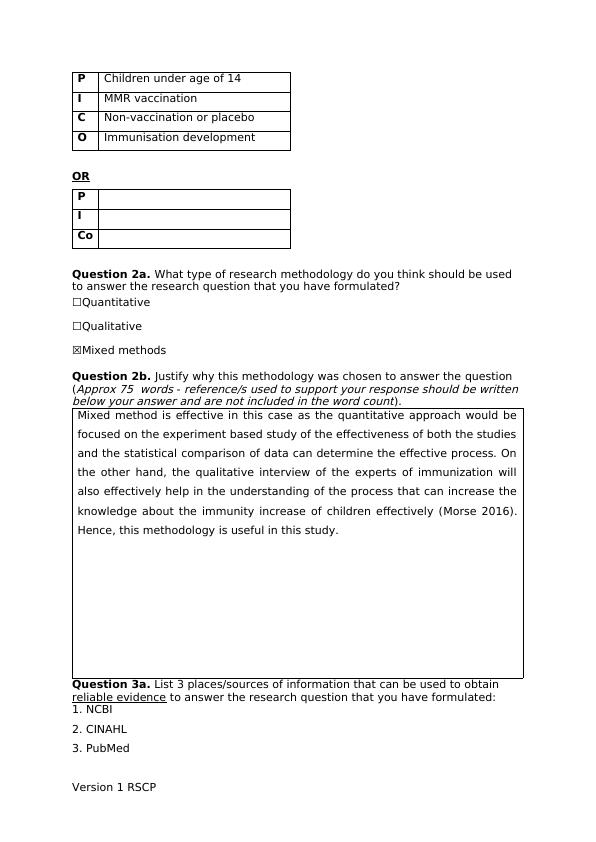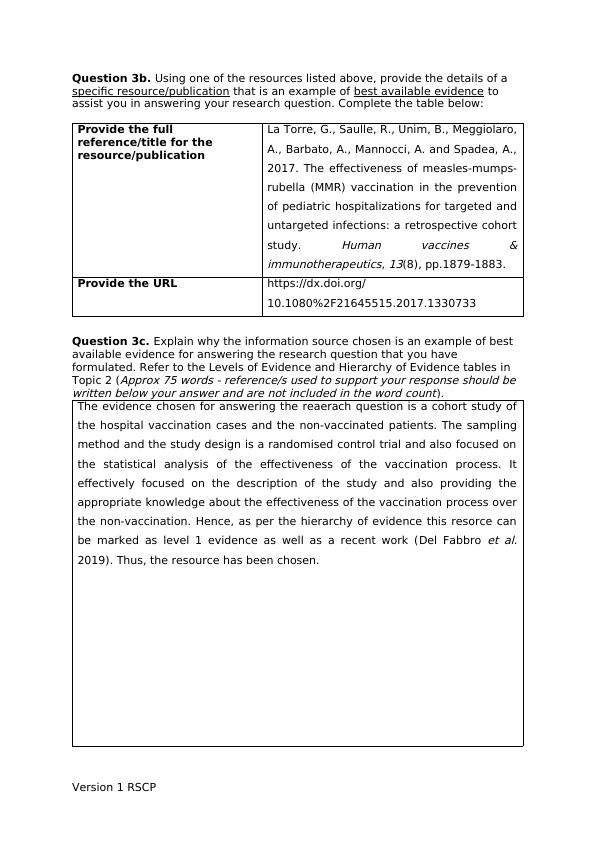Immunization –Health Beliefs | Assessment 1
Added on 2022-09-02
12 Pages4208 Words32 Views
Assessment 1 (2000 words)
Instructions:
Please read the background information below. When you have read
the background information, you can proceed to the questions on the
Assessment Template. These questions relate to the background
information.
You will need to apply the knowledge that you have gained from Topics
1-4 to complete these questions.
The marks allocated to each question are stated next to the question.
The word count is stated next to each question. Note that when the
word count says ‘equivalent’ it means that you do not need to have
that exact number of words to answer the question – just provide as
much detail as required to answer the question.
You are advised to frequently refer to the Assessment Feedback Sheet
to guide you on what characteristics of a response constitute an F2, F1,
P2, P1, C, D, and HD grade.
As with all academic work, if you refer to the work of others to support
your responses, you must reference this information using the UniSA
Harvard Reference System. You do not need to reference the articles
listed in the Tables in Question 5 but if any other sources are used,
these should be referenced.
Background: Immunisation – Health beliefs
*Nursing students: You are working as a registered nurse in a GP
Practice and one of your roles is to promote immunisation for children
(this may be the MMR or other recommended immunisations). You have
had a few parents refuse vaccinations for their children and this concerns
you as you believe that this may leave the child and communities
vulnerable to outbreaks of serious diseases.
*Midwifery students: You are working as a midwife in an antenatal
clinic. One of your roles is to promote vaccination against pertussis
(whooping cough) for pregnant women. You have had a few pregnant
women decline vaccination. This concerns you as you know that if the
pregnant woman is immune to pertussis that passive immunity is passed
to her unborn baby to protect them against pertussis when they are
newborn until they can be immunised themselves
You do not think that parents/pregnant women would deliberately expose
their children/baby/themselves to the risk of serious disease unless they
were guided by a belief that immunisation was not safe. You are vaguely
aware via media reports that there is an anti-vaccine movement, and you
want a quick overview of what it is all about. As most of us would do, you
Version 1 RSCP
Instructions:
Please read the background information below. When you have read
the background information, you can proceed to the questions on the
Assessment Template. These questions relate to the background
information.
You will need to apply the knowledge that you have gained from Topics
1-4 to complete these questions.
The marks allocated to each question are stated next to the question.
The word count is stated next to each question. Note that when the
word count says ‘equivalent’ it means that you do not need to have
that exact number of words to answer the question – just provide as
much detail as required to answer the question.
You are advised to frequently refer to the Assessment Feedback Sheet
to guide you on what characteristics of a response constitute an F2, F1,
P2, P1, C, D, and HD grade.
As with all academic work, if you refer to the work of others to support
your responses, you must reference this information using the UniSA
Harvard Reference System. You do not need to reference the articles
listed in the Tables in Question 5 but if any other sources are used,
these should be referenced.
Background: Immunisation – Health beliefs
*Nursing students: You are working as a registered nurse in a GP
Practice and one of your roles is to promote immunisation for children
(this may be the MMR or other recommended immunisations). You have
had a few parents refuse vaccinations for their children and this concerns
you as you believe that this may leave the child and communities
vulnerable to outbreaks of serious diseases.
*Midwifery students: You are working as a midwife in an antenatal
clinic. One of your roles is to promote vaccination against pertussis
(whooping cough) for pregnant women. You have had a few pregnant
women decline vaccination. This concerns you as you know that if the
pregnant woman is immune to pertussis that passive immunity is passed
to her unborn baby to protect them against pertussis when they are
newborn until they can be immunised themselves
You do not think that parents/pregnant women would deliberately expose
their children/baby/themselves to the risk of serious disease unless they
were guided by a belief that immunisation was not safe. You are vaguely
aware via media reports that there is an anti-vaccine movement, and you
want a quick overview of what it is all about. As most of us would do, you
Version 1 RSCP

consult Google, and you find the following information. Read the
information below:
The History of Vaccines: History of the anti-vaccination
movement
The College of Physicians of Philadelphia (2017)
https://www.historyofvaccines.org/content/articles/history-
anti-vaccination-movements
As you want to have an informed discussion with the parents/pregnant
women you are working with, you decide to examine the available
research. You are aware that both qualitative and quantitative evidence
inform evidence based practice, so you may chose either approach (or
both). For instance, you may investigate the evidence around the safety
of vaccination or you may explore why parents/pregnant women are
concerned about immunisation.
*Please do not include this page of background information when
you submit the assessment template to learnonline.
Assessment 1 Template*Equivalent means that your responses may not equate exactly to the
number of words that you have written. As the format for this assessment
is a template an approximate word count is given that reflects the work
required to complete the template. Suggested word counts may be given
in the template to guide you in how much detail is required in your
response. The template word count is not included in your word count.
The template itself (without the background) equates to approximately
900 words. You will note an elevated similarity percentage when this is
submitted via TurnItIn because of the template. Your lecturers/tutors are
aware of this.
Questions 1-4 (25 marks – 500 word equivalent)
Question 1a. From the background information provided above relating to
immunisation, develop a researchable question. Type the question below:
Does MMR vaccination improve the immunisation process of children under age of
14 compared to non-vaccination or placebo process?
Question 1b: Identify the elements of (words relating to) PICO or PICo in the
research question that you have formulated (delete irrelevant table)
Version 1 RSCP
information below:
The History of Vaccines: History of the anti-vaccination
movement
The College of Physicians of Philadelphia (2017)
https://www.historyofvaccines.org/content/articles/history-
anti-vaccination-movements
As you want to have an informed discussion with the parents/pregnant
women you are working with, you decide to examine the available
research. You are aware that both qualitative and quantitative evidence
inform evidence based practice, so you may chose either approach (or
both). For instance, you may investigate the evidence around the safety
of vaccination or you may explore why parents/pregnant women are
concerned about immunisation.
*Please do not include this page of background information when
you submit the assessment template to learnonline.
Assessment 1 Template*Equivalent means that your responses may not equate exactly to the
number of words that you have written. As the format for this assessment
is a template an approximate word count is given that reflects the work
required to complete the template. Suggested word counts may be given
in the template to guide you in how much detail is required in your
response. The template word count is not included in your word count.
The template itself (without the background) equates to approximately
900 words. You will note an elevated similarity percentage when this is
submitted via TurnItIn because of the template. Your lecturers/tutors are
aware of this.
Questions 1-4 (25 marks – 500 word equivalent)
Question 1a. From the background information provided above relating to
immunisation, develop a researchable question. Type the question below:
Does MMR vaccination improve the immunisation process of children under age of
14 compared to non-vaccination or placebo process?
Question 1b: Identify the elements of (words relating to) PICO or PICo in the
research question that you have formulated (delete irrelevant table)
Version 1 RSCP

P Children under age of 14
I MMR vaccination
C Non-vaccination or placebo
O Immunisation development
OR
P
I
Co
Question 2a. What type of research methodology do you think should be used
to answer the research question that you have formulated?
☐Quantitative
☐Qualitative
☒Mixed methods
Question 2b. Justify why this methodology was chosen to answer the question
(
Approx 75 words -
reference/s used to support your response should be written
below your answer and are not included in the word count).
Mixed method is effective in this case as the quantitative approach would be
focused on the experiment based study of the effectiveness of both the studies
and the statistical comparison of data can determine the effective process. On
the other hand, the qualitative interview of the experts of immunization will
also effectively help in the understanding of the process that can increase the
knowledge about the immunity increase of children effectively (Morse 2016).
Hence, this methodology is useful in this study.
Question 3a. List 3 places/sources of information that can be used to obtain
reliable evidence to answer the research question that you have formulated:
1. NCBI
2. CINAHL
3. PubMed
Version 1 RSCP
I MMR vaccination
C Non-vaccination or placebo
O Immunisation development
OR
P
I
Co
Question 2a. What type of research methodology do you think should be used
to answer the research question that you have formulated?
☐Quantitative
☐Qualitative
☒Mixed methods
Question 2b. Justify why this methodology was chosen to answer the question
(
Approx 75 words -
reference/s used to support your response should be written
below your answer and are not included in the word count).
Mixed method is effective in this case as the quantitative approach would be
focused on the experiment based study of the effectiveness of both the studies
and the statistical comparison of data can determine the effective process. On
the other hand, the qualitative interview of the experts of immunization will
also effectively help in the understanding of the process that can increase the
knowledge about the immunity increase of children effectively (Morse 2016).
Hence, this methodology is useful in this study.
Question 3a. List 3 places/sources of information that can be used to obtain
reliable evidence to answer the research question that you have formulated:
1. NCBI
2. CINAHL
3. PubMed
Version 1 RSCP

Question 3b. Using one of the resources listed above, provide the details of a
specific resource/publication that is an example of best available evidence to
assist you in answering your research question. Complete the table below:
Provide the full
reference/title for the
resource/publication
La Torre, G., Saulle, R., Unim, B., Meggiolaro,
A., Barbato, A., Mannocci, A. and Spadea, A.,
2017. The effectiveness of measles-mumps-
rubella (MMR) vaccination in the prevention
of pediatric hospitalizations for targeted and
untargeted infections: a retrospective cohort
study.
Human vaccines &
immunotherapeutics,
13(8), pp.1879-1883.
Provide the URL https://dx.doi.org/
10.1080%2F21645515.2017.1330733
Question 3c. Explain why the information source chosen is an example of best
available evidence for answering the research question that you have
formulated. Refer to the Levels of Evidence and Hierarchy of Evidence tables in
Topic 2 (
Approx 75 words - reference/s used to support your response should be
written below your answer and are not included in the word count).
The evidence chosen for answering the reaerach question is a cohort study of
the hospital vaccination cases and the non-vaccinated patients. The sampling
method and the study design is a randomised control trial and also focused on
the statistical analysis of the effectiveness of the vaccination process. It
effectively focused on the description of the study and also providing the
appropriate knowledge about the effectiveness of the vaccination process over
the non-vaccination. Hence, as per the hierarchy of evidence this resorce can
be marked as level 1 evidence as well as a recent work (Del Fabbro
et al.
2019). Thus, the resource has been chosen.
Version 1 RSCP
specific resource/publication that is an example of best available evidence to
assist you in answering your research question. Complete the table below:
Provide the full
reference/title for the
resource/publication
La Torre, G., Saulle, R., Unim, B., Meggiolaro,
A., Barbato, A., Mannocci, A. and Spadea, A.,
2017. The effectiveness of measles-mumps-
rubella (MMR) vaccination in the prevention
of pediatric hospitalizations for targeted and
untargeted infections: a retrospective cohort
study.
Human vaccines &
immunotherapeutics,
13(8), pp.1879-1883.
Provide the URL https://dx.doi.org/
10.1080%2F21645515.2017.1330733
Question 3c. Explain why the information source chosen is an example of best
available evidence for answering the research question that you have
formulated. Refer to the Levels of Evidence and Hierarchy of Evidence tables in
Topic 2 (
Approx 75 words - reference/s used to support your response should be
written below your answer and are not included in the word count).
The evidence chosen for answering the reaerach question is a cohort study of
the hospital vaccination cases and the non-vaccinated patients. The sampling
method and the study design is a randomised control trial and also focused on
the statistical analysis of the effectiveness of the vaccination process. It
effectively focused on the description of the study and also providing the
appropriate knowledge about the effectiveness of the vaccination process over
the non-vaccination. Hence, as per the hierarchy of evidence this resorce can
be marked as level 1 evidence as well as a recent work (Del Fabbro
et al.
2019). Thus, the resource has been chosen.
Version 1 RSCP

End of preview
Want to access all the pages? Upload your documents or become a member.
Related Documents
Immunisation and Health Beliefs: Assessment Templatelg...
|14
|5020
|109
Immunization Nursing Assignmentlg...
|12
|4554
|395
Immunisation and Health Beliefs: A Study on Educational Interventionslg...
|16
|5135
|342
Research Methodologies (NURS 3044)lg...
|14
|4559
|35
Assessment Templates for Nurse Practitionerslg...
|12
|3506
|142
Research Methodology for Immunisation: Factors Contributing to Parental Vaccine Hesitancylg...
|16
|3874
|197
